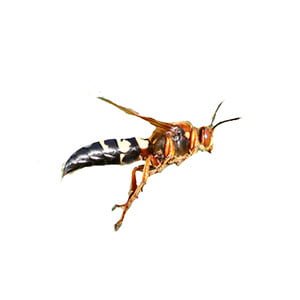
Actual Size: 1 ½”
Characteristics: Large, black abdomen with yellow markings and amber wings.
Legs: 6
Antennae: Yes
Habitat: Prefer areas in full sun, nearby cicada-heavy areas. They tunnel underground, leaving a U-shaped appearance in the soil.
Habits:
Cicada killers are one of the largest wasp species in North America. Female wasps often attack cicadas in flight, sting them until they become paralyzed, and take them back to the nest to feed her larvae. Cicada killers are found throughout the United States, Mexico, and parts of Central America. These wasps dig holes or burrows, preferably in soft, sandy, and well-drained soil. They may be found on sloped terrains, in flower beds, along patio edges or sidewalks, as well as in the yard.
Cicada killers appear as adults in late June or July in Georgia. They are mostly seen visiting flowers or digging burrows in sandy or light soil. The cicada killer wasp nests in the ground near cicada populations. Frequently, dozens of their burrows are located in lawns and on golf courses. A pile of soil often surrounds the entrance, typically in the shape of a “U”. The male wasp flies guard duty over the lawn, chasing away potential predators.
Unlike other wasp species, cicada killers are not very aggressive and rarely sting humans or pets, unless they are disturbed. Males are aggressive and territorial but do not possess a stinger. A sting from a cicada killer can be painful and their venom may cause an allergic reaction in some people. Cicada killers can be a nuisance if they are found on your property. Female wasps dig fairly large burrows, making quite a large mess near plants and vegetation. The burrowing behavior of this wasp can damage the roots of plants and make some structures, like walkways and pathways, unstable.
Even though cicada killer wasps aren’t as dangerous as certain wasps, it’s important to contact a wasp control expert for help and advice.